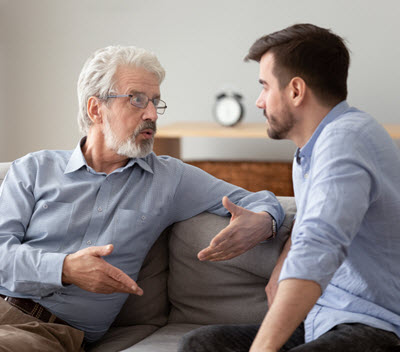“I don’t think I can stand this another minute.”
“Are my only choices to accept the status quo or leave?”
“How did the love of my life turn into my worst enemy?”
“I’ve done everything I know how to do, and nothing changes.”
“I love my mom, but I don’t think I can take care of her. And I feel so guilty!”
These are some of the comments I hear from clients who call for help in a relationship.
I hear their pain and their desperation, and I know they need help. Now.
 The Many Ways We Relate
The Many Ways We Relate
People often think of relationship counseling as being for two people who are in a romantic relationship, and that’s true. But we all live relational lives; and our romantic relationships are, usually, relatively few in number compared with the many other relationships we have throughout life.
In any one of these relationships, confusion or conflict can arise. In fact, it inevitably will somewhere along the way.
The question is not how to avoid conflict but how best to handle it when it comes.
Confusion or conflict can be a healthy sign that we truly are in a relationship.
But that doesn’t mean that it feels good at the time or that we know what to do about it. The opposite is usually true, and that’s why therapy can help.
Whether you want to come to therapy alone to discuss a relationship, or come with another person, or you’re not sure, I can help.
Making a Life Together
If you and your partner or spouse are facing an immediate crisis or need to work on a longstanding pattern that’s come up again and is causing you trouble, coming together to therapy can help.
We will work together for you to hear each other, hear yourself, and chart a path for moving forward in a stronger relationship.
Although this may sound simple, simple doesn’t mean easy.
Working on a relationship, especially while living with that person, can be difficult.
Especially when you’re facing disappointment with how you thought the relationship would be or who you thought the other person was, it is hard work.
But hard work is also one of the many aspects of love. That is, it is what love looks like.
 We don’t choose the family of our birth.
We don’t choose the family of our birth.
Our relationships exist not only as pairs but also as families.
One- or two-parent families, blended families, foster families, multigenerational families.
No two families look alike, but they all have things in common – love, conflict, hope, frustration, home. The dynamics of a family system are powerful and complex, which make family therapy both challenging and potentially very rewarding.
The “irritation” we feel toward another person originates inside us.
In a discussion of his travels to other countries, Carl Jung, in his autobiography Memories, Dreams, Reflections, made a statement that is a key also to relationship therapy: “Everything that irritates us about others can lead us to an understanding of ourselves.”
That irritation is telling us something about ourselves, something we very much need to know, or it wouldn’t be causing so much disruption in our lives.
When you come to therapy to work on a relationship, be prepared to learn about yourself as well. Consider it double the value for a single investment of your time!
Showing Up, Being Present, Being Vulnerable, Trying Again
Ultimately, we learn to love each other in our differences.
That’s both the work and the goal of relationship counseling.
By developing the foundational skills of communication and elevating relating to an art, you will open yourself up to experiencing life on a whole new level.
Many clients feel an ease in tensions from the moment they make an appointment.
Taking that first step into therapy feels like they’re finally doing something different, something hopeful. And they are. That call marks a new beginning.
My approach is to hear your story, then work with you to make small changes soon and larger changes over time.
You can do this.
Call (805) 630-3453 today to find out for yourself.

